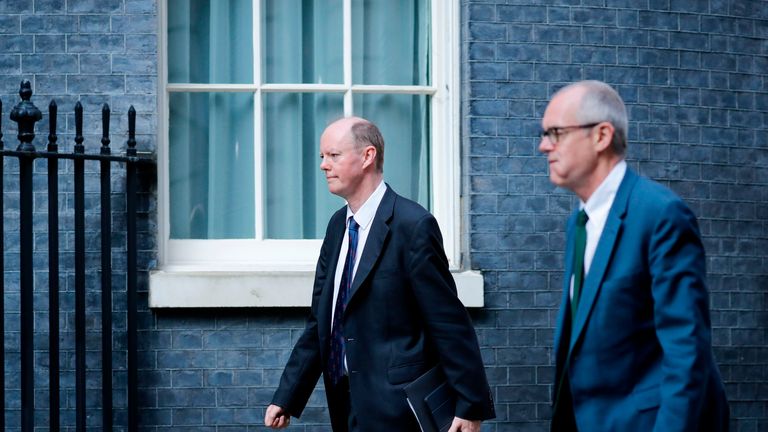Social distancing will need to continue for a “long period of time” and eliminating COVID-19 in the UK is unlikely, England’s chief medical officer has said.
Professor Chris Whitty told the Lords science and technology committee that certain hygiene measures would remain for the foreseeable future and that people would also need to continue keeping a safe distance from others.
He went on to say that aiming to eliminate the virus from the UK was “quite optimistic”.
“There are some things which we started right at the beginning, which absolutely have to continue for a prolonged period of time, washing hands, isolation, household isolation,” Prof Whitty said.
“And then we’ve added to that things like contact tracing, most recently face coverings.
“And these are issues of, and issues around distancing, which have been varied but the reality is distancing remains an important part of this mix and how it’s interpreted in different governments has evolved.
“But it has not gone away. So, all of those need to continue for a long period of time.”
It came after Prime Minister Boris Johnson told a news conference it “may conceivably be possible” to depart from social distancing measures “by November at the earliest”.
England’s chief medical officer suggested it would be very difficult to eliminate COVID-19 in a “highly connected” country like the UK.
Prof Whitty said: “Elimination means zero cases onward transmitted and for this disease this is going to be very difficult.
“We’ve tried to eliminate or eradicate a very large number of diseases over the years.
“We have so far in humans eradicated one, smallpox, and we’ve tried on a lot of other occasions, this is not an easy thing to do.”
Sir Patrick Vallance, the government’s chief scientific adviser, told the committee that it would be “incredibly important” to keep coronavirus cases low in the winter.
He said the winter was “going to be a very complex time, where the vast majority of people of course who end up with the symptoms may not have COVID, they may have something else.
“And so there are going to be people potentially being isolated for reasons that are non-COVID.”
:: Listen to the Daily podcast on Apple Podcasts, Google Podcasts, Spotify, Spreaker
Both Sir Patrick and Prof Whitty stressed the importance of having a widely-used coronavirus contact tracing app ready during the winter or if there is a surge in the number of cases.
Prof Whitty added: “But of course there are operational issues and there are privacy issues that need to be completely sorted out before we could be confident we could use that.”
It comes after Sir Patrick said the scientific advisory group for emergencies (SAGE) – of which he and Prof Whitty are key members – urged the government to impose full lockdown measures around a week earlier than they were introduced.

